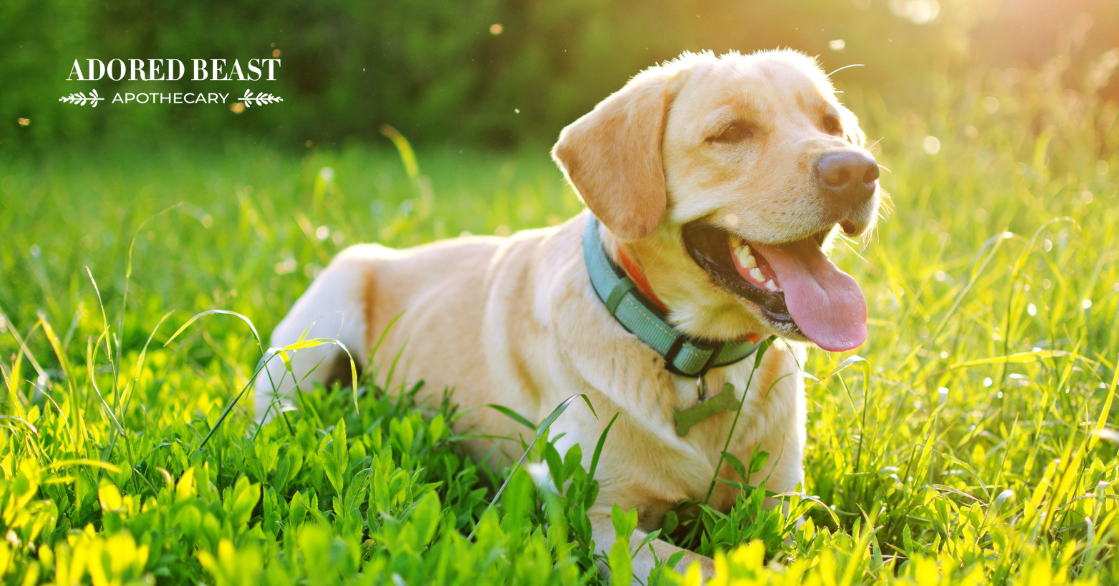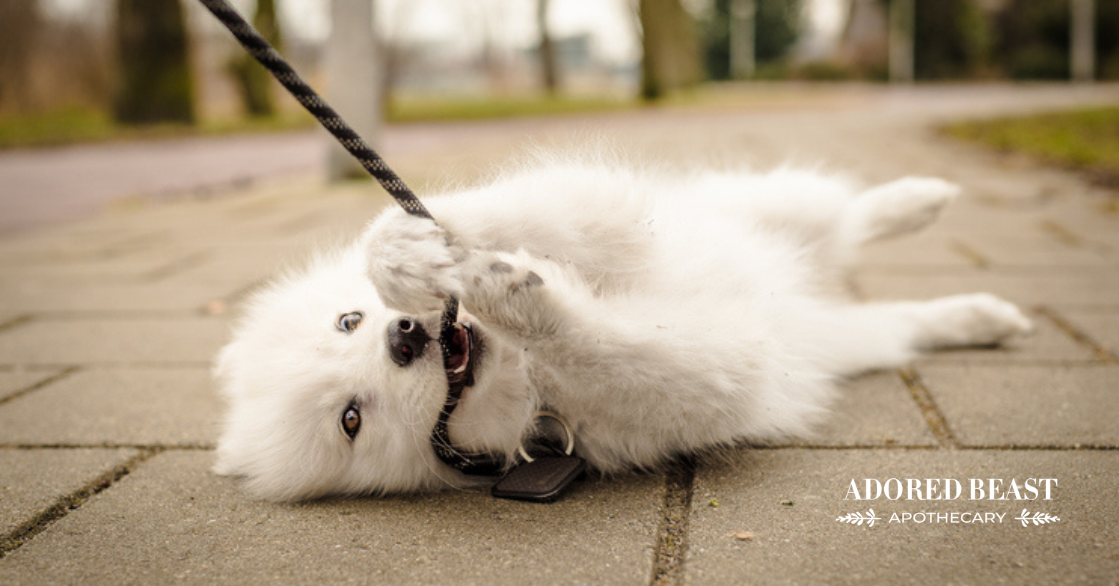Right now, at our house in Ontario, Canada, the mosquitos are driving us bonkers! If we step outside, within minutes we’re batting them away. Forget about sitting outside to relax, and a hike in the woods? Only if you feel like being eaten alive…
But really, aside from being a major nuisance, mosquitoes can pose serious health risks to our dogs. So, we are big believers in prevention as much as possible.
And whether you use conventional heartworm prevention or not (that’s not what we’re talking about here), there’s good reason to look at natural mosquito repellent for dogs as well.
In this blog, we’ll explore why mosquitoes are a problem, share some recipes for doggie-safe sprays, and give you some other tips and tricks for added protection!
Why Mosquitoes Are a Problem
Mosquitoes are vectors for several diseases, with heartworm being one of the most concerning for dogs. Heartworm disease is caused by the parasite Dirofilaria immitis, which is transmitted through mosquito bites. Once a dog is infected, the larvae mature into adult worms that live in the heart, lungs, and associated blood vessels, causing severe damage and potentially leading to heart failure and lung disease. Prevention is essential since treatment for heartworm is complex and can be risky.
Knowing this, it just makes sense to repel them, no?
Natural Mosquito Repellent for Dogs: 3 Recipes
We would NEVER, EVER reach for a “human” bug repellent for our dogs (in fact, we use our dogs’ natural repellent for ourselves). We just can’t abide the risk that comes with the chemicals being licked off the fur or being absorbed into the skin.
So if, like us, you’re not a big fan of chemicals, give these recipes for natural mosquito repellent for dogs at try!
1. Lemongrass Spray
- Ingredients:
- 10 drops of lemongrass essential oil
- 2 tablespoons of witch hazel
- 1/2 cup of water
- Instructions:
- Combine the essential oil, witch hazel, and water in a spray bottle.
- Shake well before each use.
- Lightly spray your dog’s coat, avoiding the face, eyes, and any open wounds.
**Note: Some dogs may be extra sensitive to or not like the smell of essential oils, so let them tell you if this one (or #3) is not their fave.
2. Apple Cider Vinegar Spray
- Ingredients:
- 1 cup of apple cider vinegar
- 1 cup of water
- Instructions:
- Mix the apple cider vinegar and water in a spray bottle.
- Shake well before each use.
- Spray your dog’s coat, avoiding the face, eyes, and any open wounds.
3. Lavender and Lemon Spray
- Ingredients:
- 5 drops of lavender essential oil
- 10 drops of lemongrass essential oil
- 2 tablespoons of witch hazel
- 1 cup of water
- Instructions:
- Combine the essential oils, witch hazel, and water in a spray bottle.
- Shake well before each use.
- Lightly mist your dog’s coat, avoiding the face, eyes, and any open wounds.
[RELATED] Flea and Tick Prevention: Safe, Natural Options for Our Pets & the Environment
Additional Tips for Protecting Your Dog
Planting mosquito-repelling plants around your yard can help reduce the mosquito population and provide a natural barrier. Here are some dog-friendly options:
- Lavender: Known for its calming properties and pleasant scent, lavender doesn’t just look pretty in the garden, it also deters mosquitoes.
- Lemon Balm: This plant contains citronella, a natural mosquito repellent. It’s safe for dogs and can be used in homemade sprays. Plus, it smells amazing!
- Marigolds: These bright flowers contain pyrethrum, a compound used in many insect repellents. NOTE: The marigold plant can be mildly toxic when ingested and can also cause irritation when contact is made with the fur and skin – so plant it in pots out of reach.
- Catnip: While it’s a favourite for cats, it also repels mosquitoes effectively.
- Rosemary: This herb is great for cooking and keeping mosquitoes at bay.
- Basil: Another culinary herb that mosquitoes dislike, making it a great addition to your garden.
Along with the above recipes for natural mosquito repellent for dogs, here are a few other things that you can do to ramp up the protection.
- Limit Evening and Early Morning Walks: Mosquitoes are most active during these times, so try to walk your dog during the day.
- Remove Standing Water: Mosquitoes breed in stagnant water, so regularly empty water bowls, birdbaths, and other sources of standing water.
- Use Mosquito Nets: If your dog spends a lot of time outdoors, consider using mosquito nets around their sleeping area.
- Annual Testing: It’s never a bad idea, whether you use conventional heartworm preventatives or not, to do a yearly heartworm testing with your trusted veterinarian.
Protecting your dog from mosquitoes is crucial for preventing heartworm disease and other mosquito-borne illnesses. Plus, they’re as annoying for our pets as they are for us! By using natural mosquito repellent for dogs and planting mosquito-repelling plants in your yard, you can create a safer environment for your furry friend.












![[RESEARCH] Is Herbicide Safe for Dogs?](https://blog.adoredbeast.com/wp-content/uploads/2025/06/herbicides-safe-for-dogs-103x55.png)